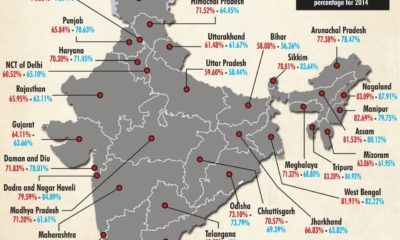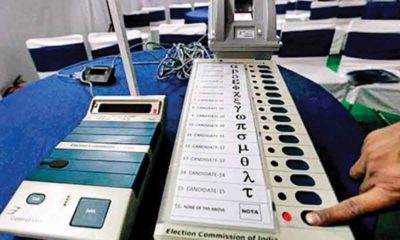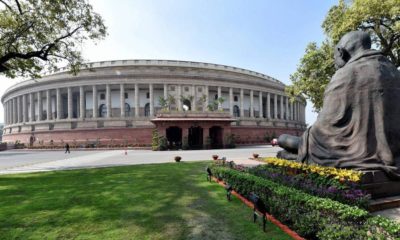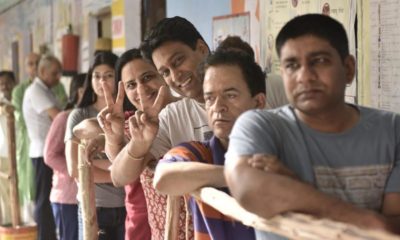World
Foreign monitors’ presence a damning indictment: Sri Lankan daily

Colombo: The presence of foreign election monitors is “a damning indictment on all those who have ruled this country during the last few decades”, said a Sri Lankan daily on Tuesday, a day after general elections were held in the country.
The Island in an editorial “After the polls…” said that general election ended peacefully.
“…the wheeling and dealing will continue for some time with the winning party going all out to muster more numbers to keep itself on an even keel. There will be bitter intra-party disputes and even defections. It will be days, if not weeks, before the UPFA (United People’s Freedom Alliance) sorts out its problems,” it added.
Monday’s polls saw a keen contest between Prime Minister Ranil Wickremesinghe led United National Front (UNF) and the United People’s Freedom Alliance (UPFA) which has former president Mahinda Rajapaksa as its main candidate.
The daily said: “We must be ashamed as a nation that we cannot conduct an election without foreign monitors though nearly seven decades have elapsed since Independence. Those men and women deserve to be thanked profusely for having taken the trouble of having come all the way here to monitor polls and issuing reports which are useful in assessing our performance as a democracy.
“But, their presence is a damning indictment on all those who have ruled this country during the last few decades.”
It went on to say that one of the top priorities of the new government will be to “appoint the Constitutional Council and ensure that the independent commissions will be fully functional”.
“Steps must be taken to prevent political interference with the electoral process even under a strong government,” the daily added.
The editorial called for “robust institutional safeguards”.
“Clean, scheduled elections are, among other things, the hallmarks of an advanced democracy. This is something Sri Lanka should strive to achieve if it is to command the respect of the global community.”
World
Lockdowns in China Force Urban Communities to Defy Censorship and Vent Frustration Online

Shanghai’s rich middle class is leading a wave of online dissent over the strict and prolonged lockdowns imposed in various parts of the country. Chinese internet censorship is struggling as patience is wearing thin in many urban centers, coming up with creative forms of online protests.
Social Media Posts Revealing Lockdown Tension in Shanghai
Drawn-out lockdowns are nothing new in China as authorities insist with the nation’s zero-Covid policy since the start of the pandemic. Currently over This time around, however, metropolitan areas like Shanghai are increasingly difficult to keep quiet, given that its more than 25 million residents have seen weeks of total isolation along with food shortages and many other service interruptions.
Dozens of towns and reportedly over 300 million Chinese citizens have been affected by lockdowns of different severity. As expected, urban netizens have been most outspoken over their difficulties by finding creative ways to get around state censorship and bans placed on topics, news comments and spontaneous campaigns.
Shanghai residents have been using mobile proxies and hijacking seemingly unrelated hashtags to talk about healthcare issues, delivery failures and the overall severity of their situation. The “positive energy” that the Chinese government wants to transmit during the recent prolonged series of lockdowns does not come naturally to those counting food supplies and online censors are working hard to filter words, trending topics and undesired social media sharing.
WeChat groups and message threads are under constant monitoring. Posts questioning the zero-Covid approach have been quickly deleted, including by leading Chinese health experts like Dr. Zhong Nanshan. Video footage is soon censored and protests and investigations are quickly made to disappear.
Where this has not worked, officials have exposed banners with warnings and outright threats like “watch your own mouth or face punishment”, while drones have been patrolling the city skies. Yet, if anything, this has led to further tensions and unspoken confrontation with Shanghai’s educated and affluent middle class.
Creative Online Solutions Harnessing Civic Energy
Announcements by Chinese social media that they would be publishing the IP addresses of users who “spread rumors” have not helped either. Tech industry research has shown that much of Asia’s tech-savvy population has a habit of using mobile proxies and other privacy tools, quickly finding workarounds to browse the internet freely and talk to the world about the hottest topics.
The sheer volume of forbidden posts is already a challenge for the very censorship system, experts explain. Unable to track all trending hashtags, state workers overlook topics that speak about the US, Ukraine or other popular news. Linking human rights elsewhere to their situation, Chinese online dissidents establish their informal channels and “hijack” the conversation to share personal or publicly relevant information about the Covid suppression in their town.
Sarcastic and satirical posts still dominate. Others hope to evade the censors by replacing words from famous poems or the national anthem. One thing is certain – social media, when harnessed with the right creativity, has proven its ability to mount pressure on the government in even some of the most strictly controlled tech environments like China.























